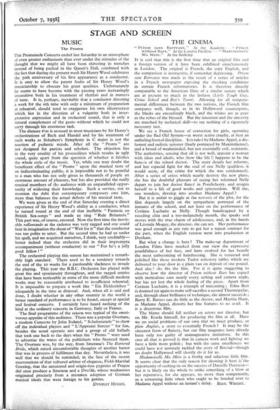MUSIC
STAGE AND SCREEN
The Proms
Tim Promenade Concerts ended last Saturday in an atmosphere of even greater enthusiasm than ever under the stimulus of the thought that we might all have been shivering in trenches instead of being packed in the Queen's Hall, combined with the fact that during the present week Sir Henry Wood celebrates the 5oth anniversary of his first appearance as a conductor. It is easy to allow the patent faults of Sir Henry Wood's musicianship to obscure his great qualities. Unfortunately he seems to have become with the passing years increasingly insensitive both in his treatment of rhythm and in matters of taste. It is, perhaps, inevitable that a conductor directing a work for the nth time with only a minimum of preparation at rehearsal, should tend to exaggerate his own idiosyncrasy which lies in the direction of a vulgarity both in inter- pretative expression and in orchestral sound, that is only a natural complement of the gusto without which he could not carry through his enormous task.
The distaste that is aroused in most musicians by Sir Henry's orchestrations of Bach and Handel and by his treatment of such works as Schubert's Symphony in C major is not the reaction of pedantic minds. After all the " Proms " are not designed for purists and scholars. The objection lies in the very crudity of his proceedings which results in ugly sound, quite apart from the question of whether it falsifies the whole style of the music. Yet, while one may doubt the beneficent effect of the " Proms " upon the musical taste of an indiscriminating public, it is impossible not to be grateful to a man who has not only given to thousands of people an enormous amount of pleasure, but has also provided the really musical members of the audience with an unparalleled oppor- tunity of widening their knowledge. Such a service, not to mention the debt that contemporary composers owe him, more than balances the actual defects of his musical taste.
We were given at the end of that Saturday evening a direct experience of Sir Henry Wood's ability as a conductor, when he turned round at the end of that ineffable " Fantasia on British Sea-songs " and made us sing " Rule Britannia." This part was, of course, encored. Now the first time the inevit- able rallentando at the cadence was very ragged and one could hear in imagination the shout of " Wait for it" that the conductor was too polite to utter. But the second time he had us under his spell, and we acquitted ourselves, I think, very creditably— better indeed than the orchestra did in their impromptu accompaniment (without conductor) to our " For he's a jolly good fellow ! "
The orchestral playing this season has maintained a remark- ably high standard. There used to be a tendency towards the end of the zo weeks for a pardonable slackness to invade the playing. This year the B.B.C. Orchestra has played with great fire and spontaneity throughout, and the ragged entries that have been noticeable in some of the more difficult modern works may be reasonably attributed to insufficient rehearsal. It is impossible to prepare a work like " Ein Heldenleben " adequately in the time at disposal. And, when all is said and done, I doubt whether in any other country in the world a better standard of performance is to be found, except at special and festival concerts. I certainly have heard nothing of the kind at the ordinary concerts in Germany, Italy or France.
The final programme of the season was typical of the omni- vorous appetite of this audience. There was a popular Overture, a modern Concerto by John Ireland, " Scheherazade" to show off the individual players and " L'Apprenti Sorcier " for fun, besides the usual operatic airs and a group of old ballads that took one back to the days when the " Proms " were used to advertise the wares of the publishers who financed them. The Overture was, by the way, from Smetana's The Bartered Bride, which raised uncomfortable thoughts of another barter that was in process of fulfilment that day. Nevertheless, it was well that we should be reminded, in the face of the recent asseverations of that cultured arbiter of elegance, Field-Marshal Goering, that the untutored and origin-less pygmies of Prague did once produce a Smetana and a Dvaik, whose weaknesses originated precisely from a mistaken adoption of German musical ideals that were foreign to his genius.
DYNELEY HUSSEY.














































 Previous page
Previous page